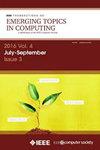减轻学生预测分析偏差的多层个性化联合学习
IF 5.4
2区 计算机科学
Q1 COMPUTER SCIENCE, INFORMATION SYSTEMS
IEEE Transactions on Emerging Topics in Computing
Pub Date : 2024-06-07
DOI:10.1109/TETC.2024.3407716
引用次数: 0
摘要
传统的学生建模方法包括基于测量活动预测成绩,由于数据可用性偏差,难以为少数民族/代表性不足的学生群体提供准确的结果。在本文中,我们提出了一种多层个性化联邦学习(MLPFL)方法,该方法在不同层次的学生分组标准上优化推理精度,例如按课程和每门课程中的人口统计子组。在我们的方法中,单个学生子组的个性化模型来源于全局模型,该模型通过元梯度更新以分布式方式进行训练,该更新考虑了子组异质性,同时保留了存在于整个数据集中的建模共性。对拟议方法的评估考虑了两种流行的下游学生建模任务的案例研究,即知识跟踪和结果预测,它们在模型训练中利用了学生行为的多种模式(例如,访问讲座视频和参与论坛)。在三个真实世界的在线课程数据集上的实验表明,我们的方法比现有的学生建模基准取得了显著的改进,这可以通过提高平均预测质量和减少不同学生子组的方差来证明。对结果学生知识状态嵌入的可视化分析证实,我们的个性化方法提取了聚类到不同学生子组的活动模式,与我们在基线上获得的性能增强一致。本文章由计算机程序翻译,如有差异,请以英文原文为准。
Multi-Layer Personalized Federated Learning for Mitigating Biases in Student Predictive Analytics
Conventional methods for student modeling, which involve predicting grades based on measured activities, struggle to provide accurate results for minority/ underrepresented student groups due to data availability biases. In this paper, we propose a Multi-Layer Personalized Federated Learning (MLPFL) methodology that optimizes inference accuracy over different layers of student grouping criteria, such as by course and by demographic subgroups within each course. In our approach, personalized models for individual student subgroups are derived from a global model, which is trained in a distributed fashion via meta-gradient updates that account for subgroup heterogeneity while preserving modeling commonalities that exist across the full dataset. The evaluation of the proposed methodology considers case studies of two popular downstream student modeling tasks, knowledge tracing and outcome prediction, which leverage multiple modalities of student behavior (e.g., visits to lecture videos and participation on forums) in model training. Experiments on three real-world online course datasets show significant improvements achieved by our approach over existing student modeling benchmarks, as evidenced by an increased average prediction quality and decreased variance across different student subgroups. Visual analysis of the resulting students’ knowledge state embeddings confirm that our personalization methodology extracts activity patterns clustered into different student subgroups, consistent with the performance enhancements we obtain over the baselines.
求助全文
通过发布文献求助,成功后即可免费获取论文全文。
去求助
来源期刊

IEEE Transactions on Emerging Topics in Computing
Computer Science-Computer Science (miscellaneous)
CiteScore
12.10
自引率
5.10%
发文量
113
期刊介绍:
IEEE Transactions on Emerging Topics in Computing publishes papers on emerging aspects of computer science, computing technology, and computing applications not currently covered by other IEEE Computer Society Transactions. Some examples of emerging topics in computing include: IT for Green, Synthetic and organic computing structures and systems, Advanced analytics, Social/occupational computing, Location-based/client computer systems, Morphic computer design, Electronic game systems, & Health-care IT.
 求助内容:
求助内容: 应助结果提醒方式:
应助结果提醒方式:


